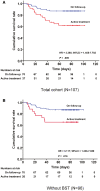Outcomes of novel coronavirus disease 2019 (COVID-19) infection in 107 patients with cancer from Wuhan, China
- PMID: 32573776
- PMCID: PMC7361610
- DOI: 10.1002/cncr.33042
Outcomes of novel coronavirus disease 2019 (COVID-19) infection in 107 patients with cancer from Wuhan, China
Abstract
Background: Patients with cancer have a higher risk of coronavirus disease 2019 (COVID-19) than noncancer patients. The authors conducted a multicenter retrospective study to investigate the clinical manifestations and outcomes of patients with cancer who are diagnosed with COVID-19.
Methods: The authors reviewed the medical records of hospitalized patients who were treated at 5 hospitals in Wuhan City, China, between January 5 and March 18, 2020. Clinical parameters relating to cancer history (type and treatment) and COVID-19 were collected. The primary outcome was overall survival (OS). Secondary analyses were the association between clinical factors and severe COVID-19 and OS.
Results: A total of 107 patients with cancer were diagnosed with COVID-19, with a median age of 66 years (range, 37-98 years). Lung (21 patients; 19.6%), gastrointestinal (20 patients; 18.7%), and genitourinary (20 patients; 18.7%) cancers were the most common cancer diagnoses. A total of 37 patients (34.6%) were receiving active anticancer treatment when diagnosed with COVID-19, whereas 70 patients (65.4%) were on follow-up. Overall, 52.3% of patients (56 patients) developed severe COVID-19; this rate was found to be higher among patients receiving anticancer treatment than those on follow-up (64.9% vs 45.7%), which corresponded to an inferior OS in the former subgroup of patients (hazard ratio, 3.365; 95% CI, 1.455-7.782 [P = .005]). The detrimental effect of anticancer treatment on OS was found to be independent of exposure to systemic therapy (case fatality rate of 33.3% [systemic therapy] vs 43.8% [nonsystemic therapy]).
Conclusions: The results of the current study demonstrated that >50.0% of infected patients with cancer are susceptible to severe COVID-19. This risk is aggravated by simultaneous anticancer treatment and portends for a worse survival, despite treatment for COVID-19.
Keywords: anticancer treatment; cancer; case fatality rate; coronavirus disease 2019 (COVID-19); systemic therapy.
© 2020 The Authors. Cancer published by Wiley Periodicals LLC on behalf of American Cancer Society.
Conflict of interest statement
Conghua Xie is supported by the Health Commission of Hubei Province Scientific Research Project (WJ2019H002); the Health Commission of Hubei Province Medical Leading Talent Project; Fundamental Research Funds for the Central Universities (2042018kf1037 and 2042019kf0329); the Medical Science Advancement Program (Basic Medical Sciences) of Wuhan University (TFJC2018005); and the Zhongnan Hospital of Wuhan University Science, Technology and Innovation Seed Fund (znpy2017049 and znpy2018070). Melvin L. K. Chua has received grants and personal fees from Ferring Singapore; has acted as a paid member of the advisory board for Janssen, Astellas, Merck, and Illumina; has acted as a paid member of the advisory board and received hardware for research from Varian; has received nonfinancial support (provision of an artificial intelligence contouring work station for research) from PAVmed Inc; and has received nonfinancial support from MedLever Inc and Decipher Biosciences for work performed outside of the current study. Dr. Chua also is supported by the National Medical Research Council Clinician‐scientist award (NMRC/CSA/0027/2018). Xiaokun Shen is the founder and Chief Executive Officer of Convalife (Shanghai) Company Ltd and has an equity interest. Xiaokun Shen was supported in part by the National Science and Technology Major Projects for Major New Drugs Innovation and Development (2019ZX09301010) and Pudong New Area Science and Technology Development Foundation (PKX2019‐S08). The other authors made no disclosures.
Figures


Comment in
-
Colorectal cancer and COVID-19: Do we need to raise awareness and vigilance?Cancer. 2021 Mar 15;127(6):979-980. doi: 10.1002/cncr.33217. Epub 2021 Jan 26. Cancer. 2021. PMID: 33498093 Free PMC article. No abstract available.
References
-
- Wong JEL, Leo YS, Tan CC. COVID‐19 in Singapore‐current experience: critical global issues that require attention and action. JAMA. Published online February 20, 2020. doi:10.1001/jama.2020.2467 - DOI - PubMed
Publication types
MeSH terms
Substances
Grants and funding
LinkOut - more resources
Full Text Sources
Medical

